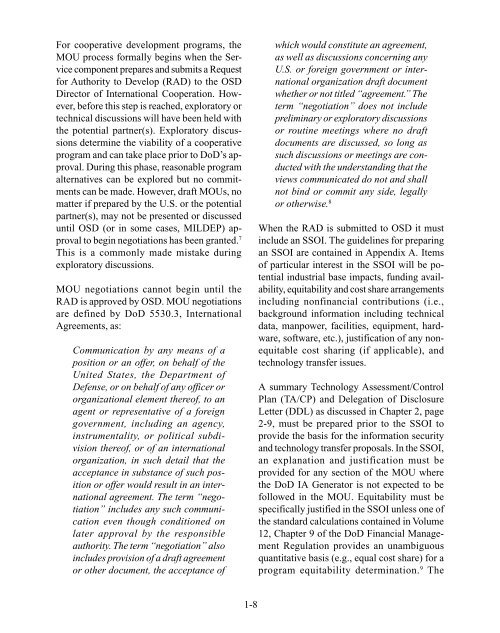Transatlantic Armaments Cooperation - Federation of American ...
Transatlantic Armaments Cooperation - Federation of American ...
Transatlantic Armaments Cooperation - Federation of American ...
You also want an ePaper? Increase the reach of your titles
YUMPU automatically turns print PDFs into web optimized ePapers that Google loves.
For cooperative development programs, the<br />
MOU process formally begins when the Service<br />
component prepares and submits a Request<br />
for Authority to Develop (RAD) to the OSD<br />
Director <strong>of</strong> International <strong>Cooperation</strong>. However,<br />
before this step is reached, exploratory or<br />
technical discussions will have been held with<br />
the potential partner(s). Exploratory discussions<br />
determine the viability <strong>of</strong> a cooperative<br />
program and can take place prior to DoD’s approval.<br />
During this phase, reasonable program<br />
alternatives can be explored but no commitments<br />
can be made. However, draft MOUs, no<br />
matter if prepared by the U.S. or the potential<br />
partner(s), may not be presented or discussed<br />
until OSD (or in some cases, MILDEP) approval<br />
to begin negotiations has been granted. 7<br />
This is a commonly made mistake during<br />
exploratory discussions.<br />
MOU negotiations cannot begin until the<br />
RAD is approved by OSD. MOU negotiations<br />
are defined by DoD 5530.3, International<br />
Agreements, as:<br />
Communication by any means <strong>of</strong> a<br />
position or an <strong>of</strong>fer, on behalf <strong>of</strong> the<br />
United States, the Department <strong>of</strong><br />
Defense, or on behalf <strong>of</strong> any <strong>of</strong>ficer or<br />
organizational element there<strong>of</strong>, to an<br />
agent or representative <strong>of</strong> a foreign<br />
government, including an agency,<br />
instrumentality, or political subdivision<br />
there<strong>of</strong>, or <strong>of</strong> an international<br />
organization, in such detail that the<br />
acceptance in substance <strong>of</strong> such position<br />
or <strong>of</strong>fer would result in an international<br />
agreement. The term “negotiation”<br />
includes any such communication<br />
even though conditioned on<br />
later approval by the responsible<br />
authority. The term “negotiation” also<br />
includes provision <strong>of</strong> a draft agreement<br />
or other document, the acceptance <strong>of</strong><br />
1-8<br />
which would constitute an agreement,<br />
as well as discussions concerning any<br />
U.S. or foreign government or international<br />
organization draft document<br />
whether or not titled “agreement.” The<br />
term “negotiation” does not include<br />
preliminary or exploratory discussions<br />
or routine meetings where no draft<br />
documents are discussed, so long as<br />
such discussions or meetings are conducted<br />
with the understanding that the<br />
views communicated do not and shall<br />
not bind or commit any side, legally<br />
or otherwise. 8<br />
When the RAD is submitted to OSD it must<br />
include an SSOI. The guidelines for preparing<br />
an SSOI are contained in Appendix A. Items<br />
<strong>of</strong> particular interest in the SSOI will be potential<br />
industrial base impacts, funding availability,<br />
equitability and cost share arrangements<br />
including nonfinancial contributions (i.e.,<br />
background information including technical<br />
data, manpower, facilities, equipment, hardware,<br />
s<strong>of</strong>tware, etc.), justification <strong>of</strong> any nonequitable<br />
cost sharing (if applicable), and<br />
technology transfer issues.<br />
A summary Technology Assessment/Control<br />
Plan (TA/CP) and Delegation <strong>of</strong> Disclosure<br />
Letter (DDL) as discussed in Chapter 2, page<br />
2-9, must be prepared prior to the SSOI to<br />
provide the basis for the information security<br />
and technology transfer proposals. In the SSOI,<br />
an explanation and justification must be<br />
provided for any section <strong>of</strong> the MOU where<br />
the DoD IA Generator is not expected to be<br />
followed in the MOU. Equitability must be<br />
specifically justified in the SSOI unless one <strong>of</strong><br />
the standard calculations contained in Volume<br />
12, Chapter 9 <strong>of</strong> the DoD Financial Management<br />
Regulation provides an unambiguous<br />
quantitative basis (e.g., equal cost share) for a<br />
program equitability determination. 9 The
















